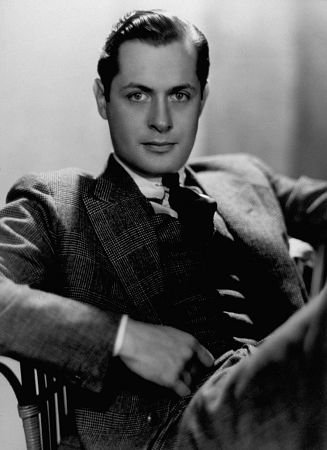Robert Montgomery (Henry Montgomery)

Robert Montgomery was born Henry Montgomery, Jr. in Fishkill Landing, New York (now Beacon, New York), to Henry Montgomery, Sr. and his wife, Mary Weed Montgomery (née Barney). His early childhood was one of privilege as his father was president of the New York Rubber Company. His father committed suicide in 1922 by jumping off the Brooklyn Bridge, and the family’s fortune was gone. Robert Montgomery settled in New York City to try his hand at writing and acting. He established a stage career, and became popular enough to turn down an offer to appear opposite Vilma Bánky in the film This Is Heaven (1929). Sharing a stage with George Cukor gave him an entry to Hollywood and a contract with Metro-Goldwyn-Mayer where he debuted in So This Is College (also 1929). One writer claimed that Montgomery was able to establish himself because he “proceeded with confidence, agreeable with everyone, eager and willing to take suggestions”. During the production of So This Is College, Montgomery learned from and questioned crew members from several departments, including sound crew, electricians, set designers, camera crew and film editors. In a later interview, he confessed “it showed [him] that making a motion picture is a great co-operative project.” So This Is College gained him attention as Hollywood’s latest newcomer, and he was put in one production after another, his popularity growing steadily. Robert Montgomery initially played exclusively in comedy roles, but portrayed a character in his first drama film in The Big House (1930). MGM was initially reluctant to assign him in such a role, until “his earnestness, and his convincing arguments, with demonstrations of how he would play the character” won him the assignment. From The Big House on, he was in constant demand. Appearing as Greta Garbo’s romantic interest in Inspiration (1930) started him toward stardom with a rush. Norma Shearer chose him to star opposite her in The Divorcee (1930), Strangers May Kiss (1931), and Private Lives (1931), which led him to stardom. During this time, Montgomery appeared in the original pre-Code film version of When Ladies Meet (1933), which starred Ann Harding and Myrna Loy. In 1935, Montgomery became President of the Screen Actors Guild, and was elected again in 1946.
In another challenging role, Robert Montgomery played a psychopath in the chiller Night Must Fall (1937), for which he received an Academy Award for Best Actor nomination. After World War II broke out in Europe in September, 1939, and while the United States was still officially neutral, Montgomery enlisted in London for American field service and drove ambulances in France until the Dunkirk evacuation. He then returned to Hollywood and addressed a massive rally on the MGM lot for the American Red Cross, in July of 1940. Montgomery returned to playing light comedy roles, such as Alfred Hitchcock’s Mr. & Mrs. Smith (1941) with Carole Lombard. He continued his search for dramatic roles. For his role as Joe Pendleton, a boxer and pilot in Here Comes Mr. Jordan (1941), Montgomery was nominated for an Oscar a second time. After the U.S. entered World War II in December, 1941, he joined the United States Navy, rising to the rank of Lieutenant Commander, and served on the USS Barton (DD-722) which was part of the D-Day invasion on June 6, 1944. In 1945, Robert Montgomery returned to Hollywood, making his uncredited directing debut with They Were Expendable, where he directed some of the PT Boat scenes when director John Ford was unable to work for health reasons. Montgomery’s first credited film as director and his final film for MGM was the film noir Lady in the Lake (1947), in which he also starred, which received mixed reviews. Adapted from Raymond Chandler’s detective novel and sanitized for the censorship of the day, the film is unusual because it was filmed entirely from Marlowe’s vantage point. Montgomery only appeared on camera a few times, three times in a mirror reflection. He also directed and starred in Ride the Pink Horse (1947), also a film noir.
Active in Republican politics and concerned about communist influence in the entertainment industry, Montgomery was a friendly witness before the House Un-American Activities Committee in 1947. The next year, 1948, Montgomery hosted the Academy Awards. He hosted an Emmy Award-winning television series, Robert Montgomery Presents, which ran from 1950 to 1957. The Gallant Hours (1960), a film Montgomery directed and co-produced with its star, his friend James Cagney, was the last film or television production he was connected with in any capacity, as actor, director or producer. In 1954, Montgomery took an unpaid position as consultant and coach to President Eisenhower, advising him on how to look his best in his television appearances before the nation. A pioneering media consultant, Montgomery reportedly had an office in the White House during this time. Robert Montgomery has two stars on the Hollywood Walk of Fame, one for movies at 6440 Hollywood Boulevard, and another for television at 1631 Vine Street. Robert Montgomery died of cancer on September 27, 1981, at Columbia-Presbyterian Hospital in Manhattan. His body was cremated and the ashes were given to the family. His two surviving children, Elizabeth and Robert Montgomery, Jr., both died of cancer as well.
Born
- May, 21, 1904
- Fishkill Landing, New York
Died
- September, 27, 1981
- New York, New York
Cause of Death
- cancer
Other
- Cremated

